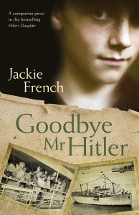Goodbye Mr Hitler by Jackie French

Angus and Robertson, 2017. ISBN 9781460751299
Historical war fiction. This story follows on from Hitler's
Daughter and Pennies
for Hitler, however I read it as a stand alone story.
This may explain why I initially found the terms such as Mutti and
Vati confusing.
The story was deliberately set towards the end of 1944 so that the
main characters who are incarcerated in Auschwitz concentration camp
have a chance to survive for the story. It ends in 1972 in
Australia.
Each chapter is set within a specific time and place and about the
experiences of the main characters: Ten year old Johannes separated
from his parents when sent to the concentration camp and German Frau
Marks whose English husband is killed but she is able to send her
son George to England before being discovered by the Germans. She
then resumes her maiden (German) name and nursing occupation.
Through their narratives, the chapters detail the horror of life and
survival or death for their families and others at the hands of the
brutal German soldiers.
Most web sites label this book for 10+ aged readers. It is arguable
whether 10 - 13 year olds have the emotional maturity or historical
context to make sense of the inhuman treatment detailed in the book.
For example early in the book, a two year old boy and four year old
girl being hidden from the Germans in the basement of the hospital
where Frau Marks works are discovered and bayoneted to death while
on Frau Marks' lap. If this were a film the violence would probably
ensure it was rated PG or higher.
Despite the horror there are acts of courage as people like Sister
Columba attempt to save and protect Jewish children - without hatred
in her heart.
Besides Johannes and his parents and Frau Marks another significant
character is Helga and her 'mother' and 'brother'. Helga finds and
helps Johannes after he escapes the camp just before the Allied
liberation. There is a mystery about her.
After the liberation of the concentration camps, the main
characters, find and are reunited with their families in the
displaced persons' camps. Eventually Johannes and his parents, Helga
and Frau Marks (whose son had been sent by his relatives to
Australia for safety) all migrate to work and live in Australia. So
there is a happy ending.
It is when the hate the characters still have for Hitler (the ogre)
can be released and forgiven that the characters are truly free from
the nightmare.
The book is suspenseful with a twist at the end regarding Helga.
According to the end notes, Jackie French based the stories on true
events told to her by survivors of the concentration camps. I found
the horrors too much at times and had to stop reading (while still
wanting to know what happens to the characters and story).
If used as a school text, there is great scope to study the themes
of: The Holocaust and anti Semitism, Friendship and love versus
hate, Hitler's Germany and Nazism, Morality and choice.
The teacher's
notes would be of use to teachers.
Ann Griffin